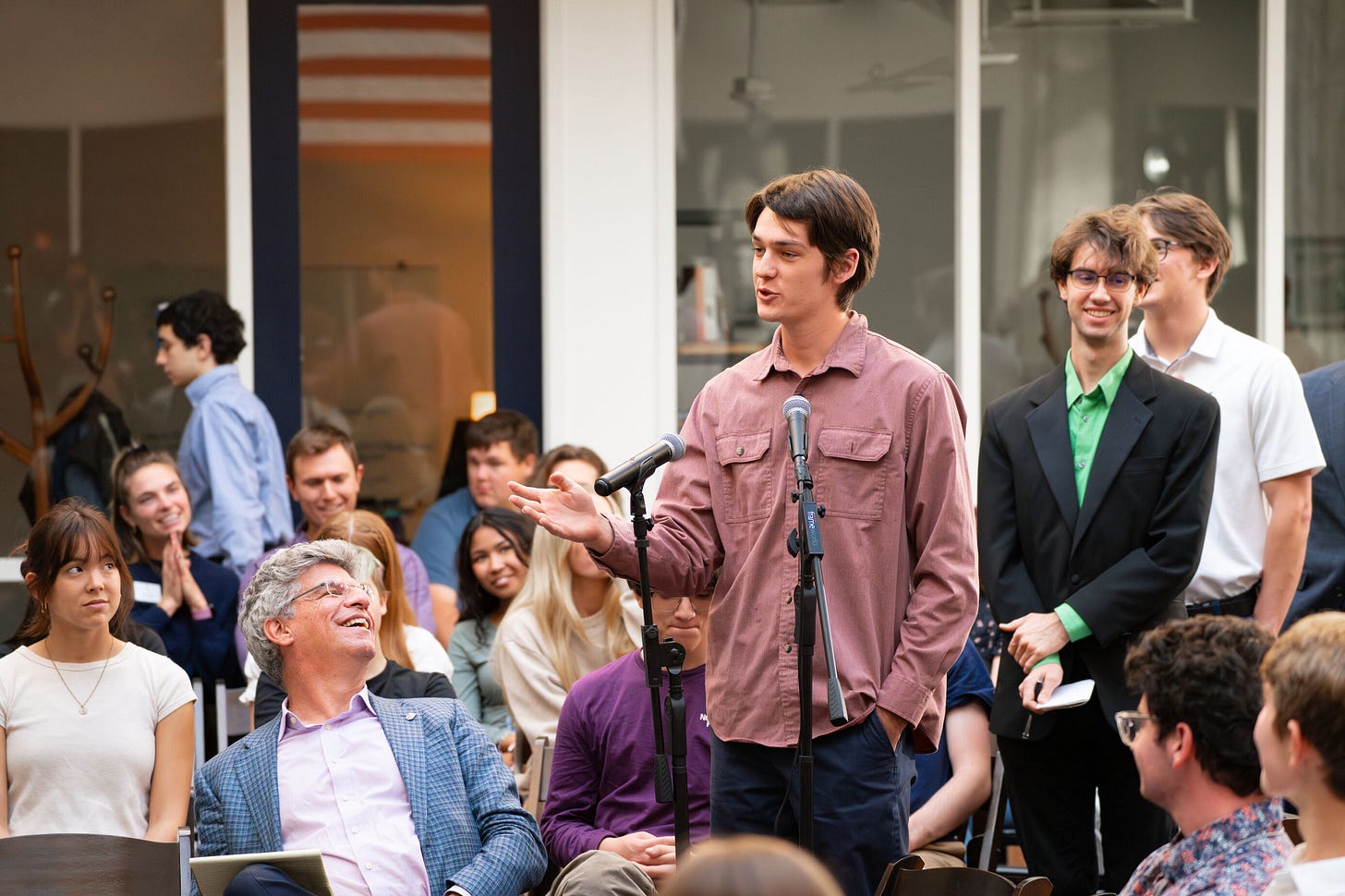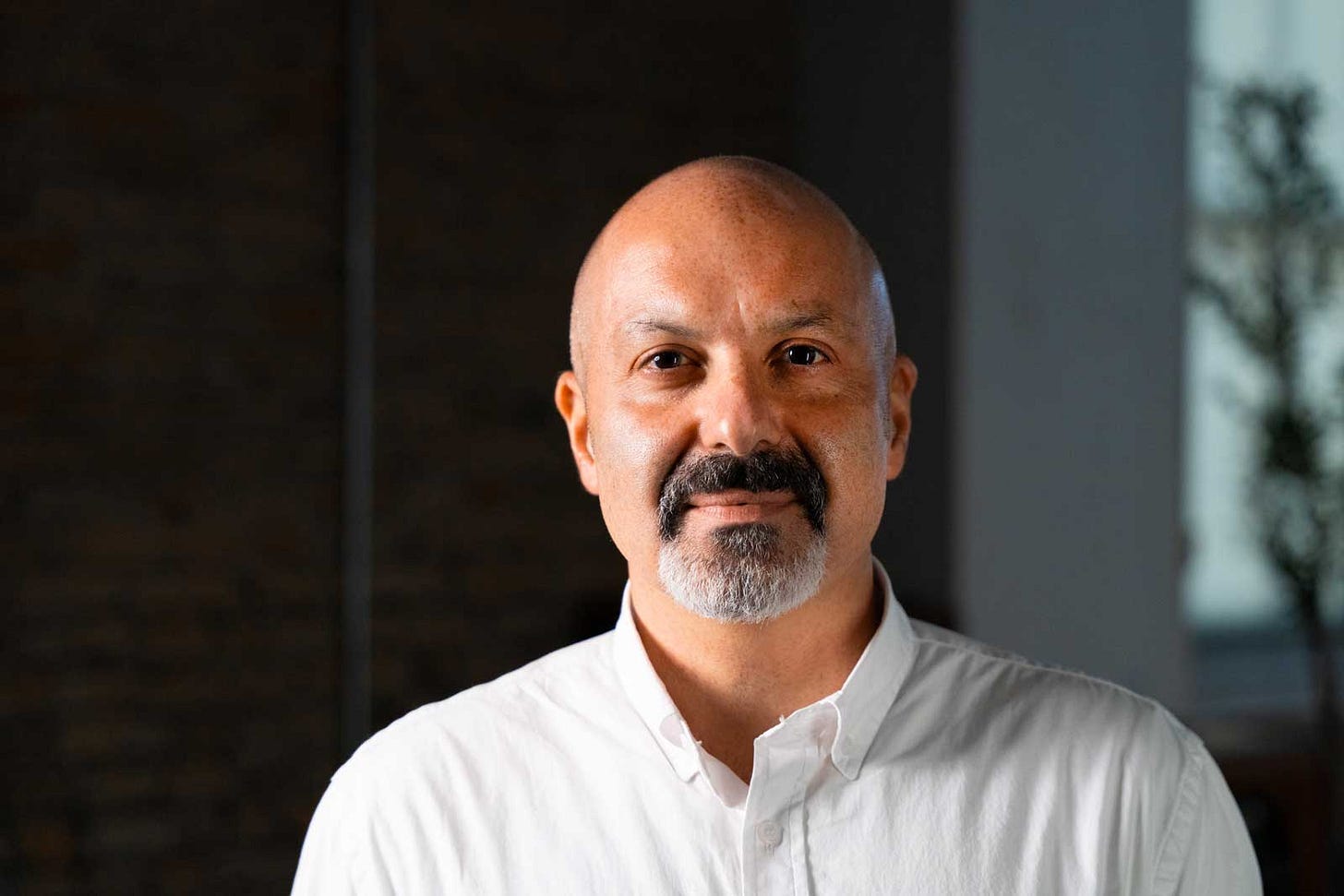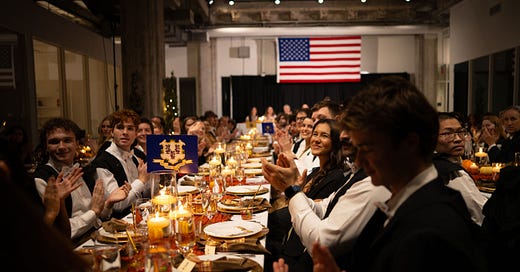
The Free Press

The University of Austin was first announced in these pages by its president in November 2021. “We are done waiting. We are done waiting for the legacy universities to right themselves. And so we are building anew,” wrote Pano Kanelos explaining why he, along with a small group that I am a part of, were starting a new university in a country full of them.
It took three years to turn an idea into reality. Boris Fishman is among the professors teaching the inaugural class. He is also the author of today’s essay. —BW
These are days of vengeance and woe. I pass them in the enemy’s lair. I’m a liberal who teaches at a “conservative” university.
“Conservative” is in quotes because the university where I teach is officially free of political persuasion. Its primary dedication is to “the pursuit of truth,” which requires freedom of speech as distinct from the de facto censorship of conservative speech on many campuses in this country. Here, the founding mission declares that any idea is welcome, and will rise and fall on its merits. Perhaps unsurprisingly, the university has drawn mainly conservative and libertarian interest and funding.
So how did I—a lifelong liberal repelled by MAGA conservatism—end up here?
I spent five years teaching creative writing at an Ivy League university where, despite good evaluations, there was no further opportunity for me because the university wanted to advance those with a different identity. I was an adviser to a talented student there who was deemed ineligible for a writing prize because, as a white person, it was not his “place” to write about the indigenous communities he was portraying (with great interest and sensitivity).
I know we liberals aren’t supposed to say these things out loud. But my family spent too many years being silent in the Soviet Union for me to pretend it didn’t happen.
As much as I personally liked my colleagues, I left the university in part because I was unwilling to keep giving of myself to a place with those values. I now teach at a university that was willing to consider my qualifications apart from those factors. As uneasy as I was about the match, I wanted to try to give of myself to a place with these values.
The University of Austin, where I teach creative writing and literature, is a Great Books university—in their other classes, my students read Aristotle and Thucydides. UATX, as the university styles itself, seeks to replace what its founders view as the emotional over-accommodation of other universities with exhortations to a classic definition of respect and engagement: Students are chided for missing the required Wednesday night lecture series; male students are urged to “improve yourself with jacket and tie” for the “polity’s occasional trips to the symphony. As one message from the university dean put it: “Excellence is about meticulousness, reverence, precision, care, and more. . . . As [Aristotle] says, ‘Moral excellence comes about as a result of habit. We become just by doing just acts, temperate by doing temperate acts, brave by doing brave acts’. . . . It matters that you be excellent in all you do.”
Sometimes these messages stray into light domination, as when students were instructed on how many pieces of tape to use per flag to affix the 2,977 flags to decorate the campus on 9/11. It’s easy to make fun of this kind of rectitude. I can point out that the spacing requirements (there were those, too) combined with our modest square footage and the number of deaths meant that flags ended up wedged into tissue boxes and armchair divots, and that by the anniversary date, many were flaccid and askew. I can point out the irony that one of the Great Books in my classroom is Tristram Shandy, a middle finger to the idea of virtuous self-improvement.
But I like that the students wanted to commemorate 9/11. (It was their idea.) I have always had an ambivalent relationship with my adopted homeland; perhaps someone born in the Soviet Union will always be wary of displays of nationalism. But sincere patriotism moves my heart like mastery in ballet: I could never do that, but God, what beauty.
I admire that no students pulled out their phones during that 90-minute visiting lecture on Hesiod. That my students won’t call me Boris even when I’ve invited them to. That when class ends, many will say, “Thank you for class, professor.” They seem grateful for the opportunity to learn from someone who knows more than they do, at least in this one thing. Surely, they know more about almost everything else; recently, in apologizing for failing to turn in an assignment, a student mentioned that he was also managing a start-up that seeks to build an Iron Dome–style missile shield for America. “You can have an extension,” I said.

It may seem tempting to ridicule this kind of respect as overly deferential, but most of the students I had at the Ivy League university were far more timid and correct; so often, they said only what I wanted to hear, or nothing at all. My UATX students disagree with me and each other, politely but firmly, about the right place to introduce a secondary character in a story, whether a character’s transformation should have taken longer on the page, and ideological issues, too. They carefully diverge from each other, knowing they won’t be attacked by their classmates—a more meaningful definition of safe space. These young people are as vulnerable and impressionable as 18-year-olds have every right to be, but they are engaged, and they are resilient. I don’t take this for granted—it depends on our discourse staying civil and cordial. That is the only thing I aspire to police. I haven’t had to do much of it yet.
I have a student who was confident enough to say, without irony, when I expressed doubt early on about whether UATX was the right match for me, “Then it will be my job to persuade you to stay.” This student read my forthcoming novel and, with neither apology nor arrogance, suggested I cut the prologue. The prologue was a fig leaf meant to justify the fact that the novel takes place in an anonymous country. (This was a commentary on the universality of the way in which majorities often fail to protect minorities around the world—one of the novel’s concerns—but also insurance against being tarred for daring to write about people who probably weren’t anything like me.) He had managed to zero in on a part of the story whose falsehood even I had managed to overlook.
At another university where I taught, a sizable group of my students in an undergraduate creative writing seminar declined to participate in class because its members weren’t interested in the literary realism I was teaching, only the fantasy genre. I tried to explain that fantasy was harder than realism, that there was something they could learn from Tobias Wolff and Eudora Welty. No dice.
After I freed them to leave class early (an accommodation I regret, but it was the only way I could save the interest of the other students, who felt silenced by the negativity of these abstainers), the abstainers complained about me to the chair of English anyway. I was urged not to penalize them for their abstention, an accommodation I also made, and which still shames me. I failed those students by failing to teach them a critical lesson about the value of being open to what we don’t already know—by the way, the original impetus behind curricular diversification initiatives—and they certainly failed themselves.
UATX remains a place where, during our convocation ceremony, one of the university deans spoke about the community as a group of pioneers akin to the early Americans who struck out West and, encountering “emptiness,” made a “rough and ready homestead without assistance from the government.” I’m pretty sure that wasn’t “emptiness,” even if every land acknowledgment I’ve ever heard has felt profoundly hollow (seemingly so, above all, to the people it’s meant to honor).
It remains a place where “great men” are habitually celebrated far more than “great women,” and where our guest speakers—Curtis Yarvin, Rod Dreher, Alex Epstein, who made the “moral case for fossil fuels”—often skew far to the right, without a balance of speakers from the left.
But this is also a place where, in a letter to my dean and provost, I declined to appear in a photo with Texas governor Greg Abbott during our convocation at the Texas Capitol. I could have slunk out of it, but I wanted them to know. In his reply, the provost alerted me that the Abbott administration had been very helpful in clearing hurdles for the university with the Texas Higher Education Coordinating Board—but he understood and respected my choice. I have not felt the freedom to be this open about a politically unpopular position—I was virtually the only person not in the photo—elsewhere.
I have students who are unvaccinated; students who wear “My Vehicle, My Choice” T-shirts as a kind of provocation, even though they’re left-leaning; students who advocate for transgender rights; students who are so comfortable being Jewish on campus that they wear massive Stars of David over their collars, as I never dared to; Mormon students who are incredibly reflective about their faith. I have a student who grew up in a conservative environment, but owing to her interest in journalism, thought her education would be incomplete without time in liberal media, and came away from her internships at The New York Times and NPR in no greater agreement with their editorial positions but with tremendous respect for their newsgathering. As she put it, “Without their reporting, conservative websites would have nothing to respond to.”

I like that one of the Jewish students, who is in STEM, not only takes his writing very seriously but begrudgingly defends the utility of public displays of Confederate flags. (This was after we read parts of Toni Morrison’s Beloved and Frederick Douglass’s autobiography. With Germany on both our minds, he proposed that, in the end, you can’t ban bad ideas, because it turns them into dark fantasies.) I like that I have a non-Jewish student who asked me for a Holocaust reading list after the same class.
I relish that the students are politically diverse, more so than the school’s reputation, and socioeconomically diverse—because class is at least the division that race is in this country. But I relish their intellectual diversity most of all. While I don’t hide my views, and we find time to debate the issues—premarital sex, gender pronouns—most of the time, we just focus on books.
As an older, left-of-center student, a former member of the Democratic Socialists of America (DSA), told me, “I’m happy at UATX, but that takes work. I couldn’t be an organizer or on the campaign trail anymore. Too much language policing and infighting. But how is it true that the people who have protected my speech rights the most are people whose beliefs I often disagree with so much?” This student’s assessment suggests what a special place UATX might be, considering that other conservatives often seem to evince as little curiosity about liberal values as vice versa.
I understand the student well. It’s uncomfortable for me to be a secular person surrounded by so many colleagues of faith; a believer in vaccines with a student who has a Kennedy/Shanahan decal on his laptop; a liberal with a colleague who has a wall sign with that old Robert Frost quote: “A liberal is a man too broadminded to take his own side in a quarrel.” I spent my first months at the university in anxious disorientation, my dreams full of directions that failed to pan out, of would-be guides who meant to fool me. But after a while, this disorientation settled into something like alertness. Aliveness. This wouldn’t be possible if the majority didn’t protect the minority view. But at this institution, it does. As the students being taught under this model enter the world, perhaps they can become ambassadors for the political coexistence that has become so grievously lost.
Like the student who interned at the Times, my ideas haven’t changed. I am still a liberal. I still think that Donald Trump is a poison in the nation’s bloodstream. But I can agree to disagree on that, if you can, without trying to degrade each other. After all, there’s so much work to do to rediscover the shared sense of purpose without which this nation is lost.
Boris Fishman’s new novel, The Unwanted, will be published by HarperCollins on March 25. He is the author of the novels A Replacement Life, which won the VCU Cabell First Novelist Award, and Don’t Let My Baby Do Rodeo, both New York Times Notable Books of the Year. He teaches creative writing and literature at The University of Austin.






